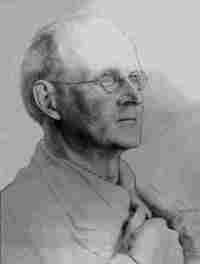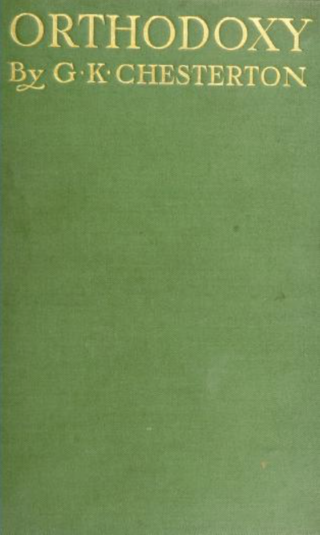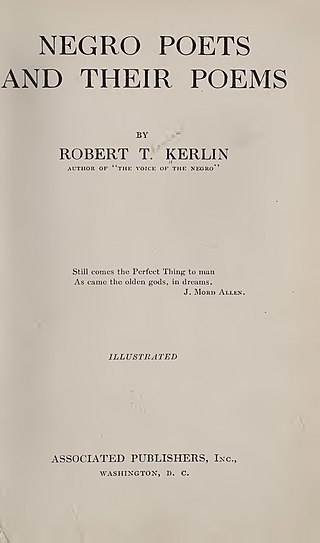
Gilbert Keith Chesterton was an English writer, philosopher, Christian apologist, and literary and art critic.

Sigmund Freud was an Austrian neurologist and the founder of psychoanalysis, a clinical method for evaluating and treating pathologies seen as originating from conflicts in the psyche, through dialogue between patient and psychoanalyst, and the distinctive theory of mind and human agency derived from it.

Charles Kay Ogden was an English linguist, philosopher, and writer. Described as a polymath but also an eccentric and outsider, he took part in many ventures related to literature, politics, the arts, and philosophy, having a broad effect particularly as an editor, translator, and activist on behalf of a reformed version of the English language. He is typically defined as a linguistic psychologist, and is now mostly remembered as the inventor and propagator of Basic English.

Father Brown is a fictional Roman Catholic priest and amateur detective. He is featured in 53 short stories by English author G. K. Chesterton, published between 1910 and 1936. Father Brown solves mysteries and crimes using his intuition and keen understanding of human nature. Chesterton loosely based him on the Rt Rev. Msgr John O'Connor (1870–1952), a parish priest in Bradford, who was involved in Chesterton's conversion to Catholicism in 1922. Since 2013, the character has been portrayed by Mark Williams in the ongoing BBC Television Series Father Brown.
Maurice Baring was an English man of letters, known as a dramatist, poet, novelist, translator and essayist, and also as a travel writer and war correspondent, with particular knowledge of Russia. During World War I, Baring served in the Intelligence Corps and Royal Air Force.

Orthodoxy is a 1908 book by G. K. Chesterton which he described as a "spiritual autobiography". It has become a classic of Christian apologetics.
This is a chronological bibliography of books and a general bibliography of articles by the author Hilaire Belloc. His books of verse went through many different editions, and are not comprehensively covered.

George Holbrook Jackson was a British journalist, writer and publisher. He was recognised as one of the leading bibliophiles of his time.
This is a list of the books written by G. K. Chesterton.

Karl Abraham was an influential German psychoanalyst, and a collaborator of Sigmund Freud, who called him his 'best pupil'.

Arthur Stuart-Menteth Hutchinson, commonly known by his initials A. S. M. Hutchinson, was a British novelist.
G.K.'s Weekly was a British publication founded in 1925 by writer G. K. Chesterton, continuing until his death in 1936. Its articles typically discussed topical cultural, political, and socio-economic issues yet the publication also ran poems, cartoons, and other such material that piqued Chesterton's interest. It contained much of his journalistic work done in the latter part of his life, and extracts from it were published as the book The Outline of Sanity. Precursor publications existed by the names of The Eye-Witness and The New Witness, the former being a weekly newspaper started by Hilaire Belloc in 1911, the latter Belloc took over from Cecil Chesterton, Gilbert's brother, who died in World War I: and a revamped version of G. K.'s Weekly continued some years after Chesterton's death by the name of The Weekly Review.
Edward George Glover was a British psychoanalyst. He first studied medicine and surgery, and it was his elder brother, James Glover (1882–1926) who attracted him towards psychoanalysis. Both brothers were analysed in Berlin by Karl Abraham; indeed, the "list of Karl Abraham's analysands reads like a roster of psychoanalytic eminence: the leading English analysts Edward and James Glover" at the top. He then settled down in London where he became an influential member of the British Psycho-Analytical Society in 1921. He was also close to Ernest Jones.

The Beauty Prize is a musical comedy in three acts, with music by Jerome Kern, book and lyrics by George Grossmith and P. G. Wodehouse. It was first produced by Grossmith and J A E Malone on 5 September 1923 at the Winter Garden Theatre, Drury Lane, London. It was designed to replace The Cabaret Girl, which the same team had produced with great success the previous year, at the same theatre and with predominantly the same cast, but failed to achieve the same success. The review of the first night performance in The Times described it as:
not ... equal to its select band of predecessors... It has quite an involved plot, which is never very interesting: a vast number of characters, most of whom are never very convincing ... The 'book', by Mr George Grossmith and Mr P G Wodehouse, has many flashes of wit but, on the whole, the narrative is an arid desert in which the music of Mr Jerome Kern makes only an occasional oasis... At the end the piece obtained rather a mixed reception.
Walter Alison Phillips was an English historian, a specialist in the history of Europe in the 19th century. From 1914 to 1939 he was the first holder of the Lecky chair of History in Trinity College Dublin. Most of his writing is in the name of W. Alison Phillips, and he was sometimes referred to as Alison Phillips.
Joseph Peter de Fonseka (1897–1948) was a Sri Lankan essayist and editor. His essays were noted for their trenchant humour and defence of Roman Catholic values, in the style of G. K. Chesterton and Hilaire Belloc. He was a friend and collaborator of the former.
Dave Armstrong is an American Catholic apologist, author, and blogger.

Revolutionary Sonnets and Other Poems is a posthumous collection of the short poetry written by Anthony Burgess. Compiled and edited by Kevin Jackson, who also provided a short introduction to the text, the book purports to collect most if not all of the poems published under the names F. X. Enderby, John Burgess Wilson, or Anthony Burgess, as well as selections from longer verse works by Burgess.

Philosophical Essays on Freud is a 1982 anthology of articles about Sigmund Freud and psychoanalysis edited by the philosophers Richard Wollheim and James Hopkins. Published by Cambridge University Press, it includes an introduction from Hopkins and an essay from Wollheim, as well as selections from philosophers such as Ludwig Wittgenstein, Clark Glymour, Adam Morton, Stuart Hampshire, Brian O'Shaughnessy, Jean-Paul Sartre, Thomas Nagel, and Donald Davidson. The essays deal with philosophical questions raised by the work of Freud, including topics such as materialism, intentionality, and theories of the self's structure. They represent a range of different viewpoints, most of them from within the tradition of analytic philosophy. The book received a mixture of positive, mixed, and negative reviews. Commentators found the contributions included in the book to be of uneven value.

Negro Poets and Their Poems is a 1923 poetry collection by Robert T. Kerlin. It was one of the major anthologies of African American poetry published during the Harlem Renaissance and has been cited as a valuable source of information on the era.












